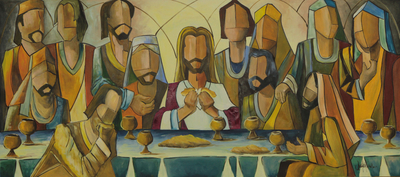
MAUNDY THURSDAY
As Dido Queen of Carthage, the eponymous heroine of Purcell’s opera faces death, she cries “Remember me but ah forget my fate.” Dido has pledged herself to newly-found lover, Aeneas, but at the height of their joy, he is summoned back to war. It presents him with an agonising decision. Should he obey the gods and fulfil his military duty or should he follow his heart and stay with Dido? “Offend the gods and love obey” he sings to the queen but ultimately she urges him to follow Jove’s command. He sets sail, abandoning the heartbroken Dido to her fate as she stands before her own funeral pyre. The tragedy is that in fact through an act of treachery and deceit, it was the wicked Sorceress and her crones who summoned away the unsuspecting hero, rather than the gods.
When people die, one of their fondest hopes is to be remembered by friends and family, eclipsing the memories of any pain or suffering. Another dying wish may be that loved ones will go on to enjoy life, experience good fortune and prosperity and learn from their example. “Look after yourselves” says ancient Greek philosopher Socrates to his friends as he prepares to drink the cup of poison, the punishment meted out to him by the city of Athens for corrupting the youth of the city. “Keep your spirits up. Tell yourself it’s only my body you are burying.” When all this proves too much and one of his followers cannot control his grief, Socrates says. “Really, my friends, what a way to behave. That’s why I sent the women away to avoid this sort of disturbance. We should approach our end in a tranquil frame of mind.
What of Jesus’ hopes on the night he was betrayed and faced his own death? Like Dido he wished to be remembered, but for him, the nature of his earthly demise was an integral part of the legacy of his life and teachings. This explains why Christians take the opportunity in Holy Week, to recall and reflect on the suffering and death of Jesus. A third of the gospel story is taken up with the passion narrative.
In the Garden of Gesthsemane Jesus faced an agonising decision of his own, but unlike Aeneas, in his story as portrayed in the gospel, Jesus’ obedience to death is a response to the call of love. Jesus, like Socrates met with his disciples before his death and urged them to live by his teaching, but not with a “Calm yourself” and “Send the women away”. The women closest to Jesus are in fact the ones who watch at the foot of cross and attend to his body for burial. Jesus invites his disciples to share his fate, to take up their cross, almost as if Socrates had taken the cup of poison and passed it around his followers. In this way Jesus, with remarkable creativity and daring takes the thousand year old ritual of the Passover meal, traditionally a celebration of the Israelites’s freedom from slavery in Egypt and says “do this in remembrance of me”.
We need to appreciate what a remarkable and unique human story this is before exploring any theological significance.
Thanks Stephen. Non Nobis and Joyful Easter tide on Sunday; the girls are hitting all the top notes!
Happy Easter Barclay
>
LikeLike
Sounds like a great service …. how it goes well
LikeLike